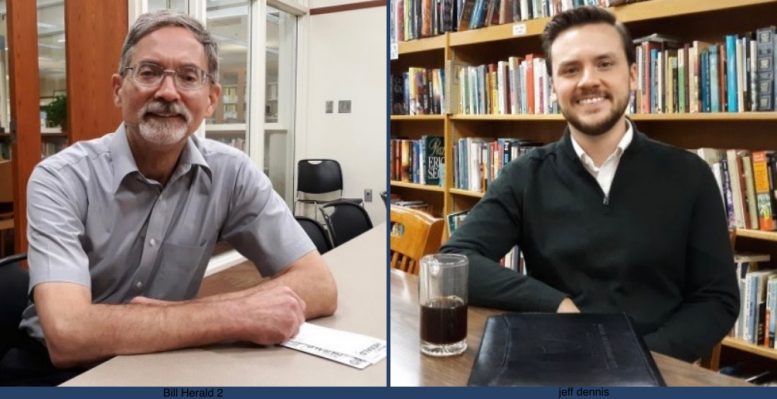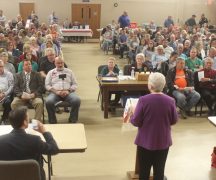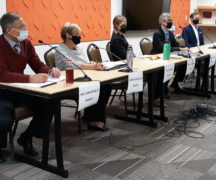By JAN LARSON McLAUGHLIN
BG Independent News
Planning may not seem like a controversial subject. But one of the battle lines drawn in the race for the Fourth Ward seat on Bowling Green City Council has to do with when planning should end and doing should begin.
Running as the incumbent is Republican Bill Herald, who held the position first from 1984 to 1991, and again now. He is a data scientist at First Solar.
Challenging him is Democrat Jeff Dennis, who studies law at the University of Toledo, and formerly worked as an election administrator at the Wood County Board of Elections.
Both candidates see the value of planning – but they disagree about when an investment of time becomes a waste of time.
Following are some of the beliefs held by both men, and the goals they would like to accomplish if elected.

Dennis is frustrated by the slow progress of City Council. He doesn’t dispute the need for planning – but he also sees a need for action.
“I hope this is a real watershed moment for the community,” he said. “It’s very important that we take those plans and turn them into action.”
Dennis pointed to long-standing issues in the city – such as the decline of housing and the need for bike paths.
“They are not easy things to solve,” he acknowledged. But “we’ve identified a lot of these issues,” and some have gotten worse while little is done.
In 2011, a study of substandard housing showed $54 million in lost property value, he said.
“Simply working hard and not having an impact is not getting it done,” he said.
Dennis referred to the nine months of discussion earlier this year about banning plastic bags – an issue that was eventually tabled. And he pointed at his opponent’s 200-plus-page Powerpoint on food trucks.
“We’re not reinventing the wheel on this,” he said.
And he mentioned the multiple planning reports contracted for by the city, saying they resulted in “spending hundred thousands of dollars and not seeing any action.”
Dennis supports the city’s effort to update its zoning rules. The current rules are outdated, he said, pointing to the antiquated parking lot regulations that resulted in far too many parking spots that now sit empty at the CVS store downtown.
“We need to be getting the most bang for our buck,” he said. “And huge empty parking lots are not doing that.”
He noted the challenge that the current rules pose for existing businesses that want to expand, or new businesses that want to locate here – such as Menards.
Zoning is important for the future of Bowling Green. “It’s going to change the shape of our community for the next 100 years,” he said.
He believes the city should explore higher density development in the downtown area, for townhouses and multi-use developments.
Dennis also sees the need for greater emphasis on neighborhood revitalization, perhaps using tax abatement tools to reinvest in areas.
“We haven’t done anything to address it,” he said. “We need to make it more expensive to be an absentee landlord in Bowling Green.”
Sustainability has a big place in Dennis’ plans for the city. Those plans include a goal of cutting landfill waste generated in the city by 30 percent over the next 10 years.
He would like to create community-wide composting and increase the frequency of yard waste pickups.
Currently, citizens have no incentive to reduce their landfill waste since the garbage fees charged by the city add up to $800,000 a year, even if the city only pays $250,000 a year in landfill fees, Dennis said.
Those environmental efforts will help bring new residents to the community, he said.
“It will help us attract the younger families,” he said.
Dennis would like to see Bowling Green continue its green energy efforts by proceeding with its community solar project.
“We need to push forward with that,” he said. “Bowling Green has been a leader in energy production.”
Next, he would like to see the city explore geothermal energy.
The city could have more success attracting and retaining young families if it took big steps toward more affordable housing and smaller steps to offer on-street dining downtown, bike paths or bike lanes, and dog parks.
“We’ve got a great park system,” but a dog park would add to the diversity of offerings, he said.
Dennis believes City Council could benefit from having a younger member.
“It always helps to have new perspectives and have a diverse group come together,” he said.

Herald sees his role on City Council as providing a link between his constituents and city government.
“To me, the main reason to be on council is to serve,” he said. “I view the position as a public servant, not a politician.”
Herald realizes he is often the slow moving cog in the city’s planning process. But as an analyst by trade, he defended his dedication to studying issues before taking steps forward.
“Planning without action is ineffective. Action without planning is dangerous,” he said.
He recognizes there is a happy medium. “There’s a sweet spot” between planning and doing – and that spot differs per person.
“I have learned in my first term back that the style of analysis I use in my job” is not always appreciated at council. He reflected back on his 200-plus food truck slides – which included appendices and sources.
“I saw that did not resonate with people. I did learn. I scaled it back,” he said.
And looking back, the food truck changes moved pretty quickly, with meetings wrapping up after two months, he said. “We did do our due diligence.”
As for the plastic bag ordinance, Herald defended the slow, methodical process.
“It’s not something you want to decide quickly. This is impactful,” he said. “You want to err on the side of thoroughness.”
Herald pushed for the bag ban to be decided by a public vote. “It was an insistence, more than a preference.”
He denies that council has stood still while the population growth of the city has stagnated.
“The idea of studying things to death and not doing anything is just not accurate,” he said.
To solve this problem and bring “responsible growth,” the city needs “partnerships, planning and performance,” he said.
Herald noted the land use plan and Community Action Plan contracted for by the city.
“We’re continuing to look forward and move in a systematic way,” he said. “There’s a lot to do, so you pick and choose. We just need to stay the course.”
He agrees the city’s zoning code needs to be updated.
“It served us well in the past, but it’s got to be redone,” he said. That should help attract businesses to the city. “If a business is interested in coming to town, we should be able to work with them.”
One of his goals is to work on neighborhood revitalization.
“We have to address that. It’s been kicked down the road too long,” he said.
Herald believes the city should investigate some form of rental registration, licensing or inspections.
“We need to have the conversation,” he said.
As he runs for re-election, Herald is finding himself defending his actions from 2010 when he was not on council. As a citizen, he objected to one of two anti-discrimination ordinances proposed by City Council. While he supported the one banning housing discrimination based on sexual orientation, he did not think the “boilerplate” ordinance for employment fit Bowling Green.
City Council planned to exempt Bowling Green Christian Academy and St. Aloysius schools from the ordinance, but did not include the exemption language in the wording. Herald asked council to add the exemption, and once the ordinances both won voter support, council did so.
“The end result is we ended up with better legislation,” he said.
Above all, Herald said he wants to continue his job of “constituent service.” He rattled off some of the problems that Fourth Ward residents have brought to him to solve. There were the flooding issues, the street light shining in a bedroom window, the mailbox across the street from a residence, and branches brushing against the roof of an elderly woman. In that case, Herald trimmed the branches himself.
“Not every issue is readily solvable,” he said. “The job is not a glamorous job. It’s roll up the sleeves, and do the studies, and do the work.”





